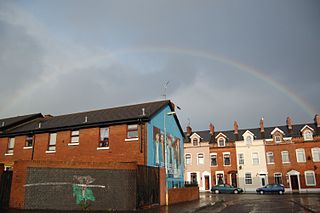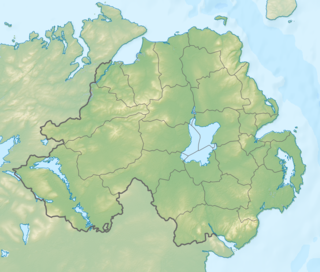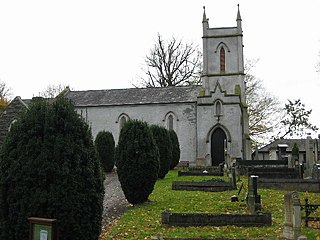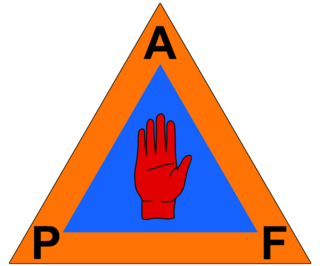
The Irish People's Liberation Organisation was a small Irish republican paramilitary organisation which was formed in 1986 by disaffected and expelled members of the Irish National Liberation Army (INLA) whose factions coalesced in the aftermath of the supergrass trials. It developed a reputation for intra-republican and sectarian violence and criminality, before being forcibly disbanded by the Provisional Irish Republican Army (IRA) in 1992.
This article lists the major violent and political incidents during the Troubles, peace process, and a dissident campaign in Northern Ireland, starting in the late 1960s until the present day. The Troubles was a period of conflict in Northern Ireland involving republican and loyalist paramilitaries, the British security forces, and civil rights groups. The Troubles is usually dated from the riots of 1968 through the Good Friday Agreement of 1998. However, sporadic violence continued after this point. Those that continued violence past this point are referred to as "dissident republicans and loyalists". The Troubles, between 1968 and 1998, claimed roughly 3500 lives while the Dissident Irish Republican Campaign 1998–present, has claimed around 150 lives. By 2019, interethnic and intercommunal violence petered out to near non-existence; nefarious activity largely consists of street and drugs-related crimes and robberies.
The Troubles in Dungannon recounts incidents during, and the effects of, The Troubles in Dungannon, County Tyrone, Northern Ireland.
The South Armagh Republican Action Force sometimes called simply the Republican Action Force was an Irish republican paramilitary group that was active from September 1975 to April 1977 during the Troubles in Northern Ireland. Its area of activity was mainly the southern part of County Armagh. According to writers such as Ed Moloney and Richard English, it was a covername used by some members of the Provisional IRA South Armagh Brigade. The journalist Jack Holland, alleged that members of the Irish National Liberation Army (INLA) were also involved in the group. During the same time that the South Armagh Republican Action Force was active the INLA carried out at least one sectarian attack that killed Protestant civilians using the covername "Armagh People's Republican Army". According to Malcolm Sutton's database at CAIN, the South Armagh Republican Action Force was responsible for 24 deaths during the conflict, all of whom were classified as civilians.

The Ballymurphy Massacre was a series of incidents between 9 and 11 August 1971, in which the 1st Battalion, Parachute Regiment of the British Army killed eleven civilians in Ballymurphy, Belfast, Northern Ireland, as part of Operation Demetrius. The shootings were later referred to as 'Belfast's Bloody Sunday', a reference to the killing of civilians by the same battalion in Derry a few months later.
The Troubles in Ardoyne lists incidents during the Troubles in the Ardoyne district of Belfast, Northern Ireland.
The Night of the Long Knives is the name given to the night in Belfast of 31 October 1992, when the Provisional IRA's Belfast Brigade launched a large military operation to wipe out the IPLO Belfast Brigade, who most Irish republicans in the city felt were becoming an embarrassment to Irish republicanism due to their involvement in drug dealing, criminality and internal Irish republican feuds.
The Rose & Crown Bar bombing was a bomb attack carried out against a Catholic-owned pub in Belfast. The attack was carried out by the loyalist paramilitary group the Ulster Volunteer Force (UVF) just less than two weeks before the start of the Ulster Workers' Council strike of May 1974 which brought down the Sunningdale power sharing agreement and just 15 days before the UVF caried out the Dublin and Monaghan bombings which killed 34 and injured 300 people, the highest casualty rate in a single day during The Troubles in either Ireland or Britain.
On 5 April 1975 Irish Republican paramilitary members killed a UDA volunteer and four Protestant civilians in a gun and bomb attack at the Mountainview Tavern on the Shankill Road - the heart of Loyalist Belfast. The attack was claimed by the Republican Action Force believed to be a covername used by Provisional IRA (PIRA) Volunteers. Earlier in the day, two Catholic civilians were killed in a bomb attack in a Belfast pub carried out by the Protestant Action Force a name used by the Ulster Volunteer Force to claim some attacks. An elderly Catholic man was shot later the same night by Loyalists bringing the death toll to eight for the day.
On 2 October 1975 the Loyalist Paramilitary group the Ulster Volunteer Force (UVF) carried out a wave of shootings and bombings across Northern Ireland. Six of the attacks left 12 people dead and around 45 people injured. There was also an attack in a small village in County Down called Killyleagh. There were five attacks in and around Belfast which left people dead. A bomb which exploded in Coleraine left four UVF Volunteers dead. There were also several other smaller bombs planted around Northern Ireland but other than causing damage they didn't kill or injure anyone.
On 23 October 1971 undercover soldiers from the British Army shot dead three unarmed Catholic civilians in disputed circumstances in Newry.

In the late hours of 3 February and the early hours of 4 February 1973, six men, all of whom were Catholics, were shot and killed in the New Lodge area of north Belfast, four of them were shot dead at the junction at Edlingham Street by British Army snipers, the other two men were shot dead by the Ulster Defence Association (UDA). Irish Nationalists and Republicans believe that collusion took place between the British security forces and Loyalist paramilitaries in the shootings. The six men who were killed became known as "The New Lodge Six".

The Strand Bar Bombing was a gun and bomb attack carried out by the Loyalist Paramilitary organisation Ulster Volunteer Force (UVF) in Belfast in 1975. The blast destroyed most of the building and killed six civilians and injured about 50 more.

The Central Bar bombing was a bomb attack on a pub in the mainly Protestant town of Gilford near Portadown in County Down in Northern Ireland on 31 December 1975. The attack was carried out by members of the Irish National Liberation Army (INLA) using the covername " People's Republican Army". Three Protestant civilians were killed in the bombing.

On the 28 March 1991 the Loyalist paramilitary organization the Ulster Volunteer Force (UVF) carried out a gun attack on a mobile shop in the Drumbeg estate in the town of Craigavon in County Armagh shooting dead three Catholic civilians. Two of those killed were teenage girls.
The following is a timeline of the Irish conflict in the Republic of Ireland between 1969–1998. Including Ulster Volunteer Force bombings like the Dublin and Monaghan bombings in May 1974 and earlier and later loyalist bombings the last of which was in 1997, these Loyalist attacks killed dozens of people in the Irish state. And actions by Irish Republicans including prison escapes, kidnappings & gun battles/shoot-outs with The Gardai & Irish Defence Forces vs Republican gunmen from the INLA, Provisional IRA & a Socialist-Revolutionary urban group Saor Éire, these shoot-outs led to the deaths of a number of Republican & Irish State Forces deaths

The 1991 Craigavon killings took place on the 14 November 1991 when the Mid-Ulster Brigade of the Ulster Volunteer Force (UVF) shot dead three civilians at the Carbet Road-Carn Road junction near Craigavon, County Armagh, Northern Ireland, on their way home from work at a forklift factory just outside Lurgan.
The Irish National Liberation Army Belfast Brigade was the main brigade area of the Irish National Liberation Army. The other Brigade areas were in Derry & Armagh with smaller units in Newry, east & west Tyrone & south Fermanagh.
The Imperial Hotel bombing was a no-warning car bombing carried out by the Ulster Loyalist paramilitary group the Ulster Volunteer Force (UVF) on the Imperial Hotel situated along the Cliftonville Road close to the Antrim Road in Belfast.

The Store Bar shooting was a mass shooting that occurred on the 25 June 1976 in the late evening when an armed group of men calling themselves the Republican Action Force walked into The Store Bar on Lyle Hill Road in Templepatrick, County Antrim.










